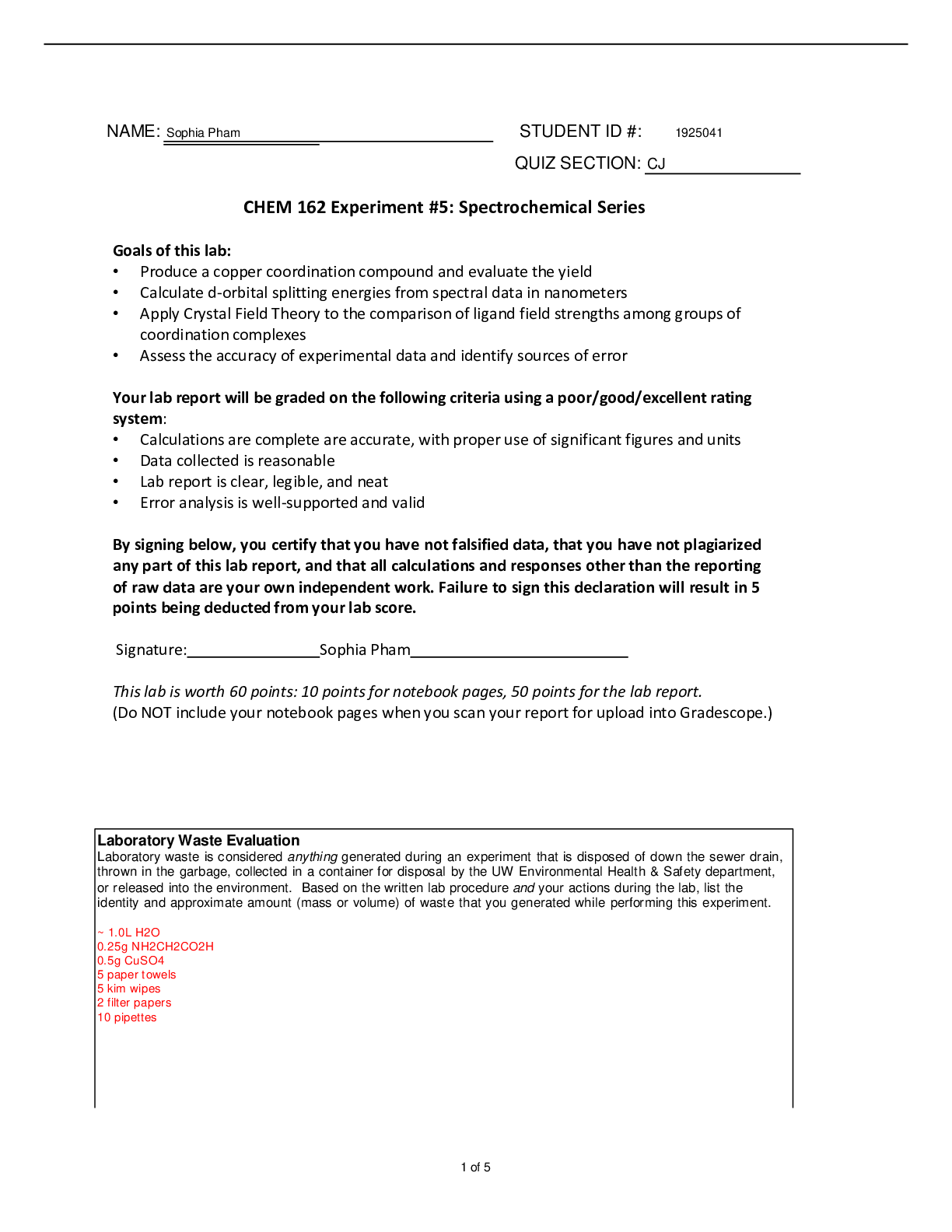Chemistry > Lab Report > Acid Dissociation of Constant Methyl Red Binghamton University - CHEM 108Acid Dissociation Lab Repor (All)
Acid Dissociation of Constant Methyl Red Binghamton University - CHEM 108Acid Dissociation Lab Report #5
Document Content and Description Below
Experiment #5: Acid Dissociation of Constant Methyl Red Alan Diffenderfer and MD Islam Department of Chemistry, Binghamton University, Binghamton, NY 13902 March 15, 2020 Introduction The purpose... of this experiment is to understand the basics of using spectrophotometers and pH sensors in order to calculate the MR-, HMR, pKa, and Ka of solution sets 1(A and B) and 2(A and B). Spectrophotometers are instruments that measure the wavelength of electromagnetic radiation. The principle behind it is that it will either absorb or transmit light which results in wavelength. The darker a solution, the more absorbance there will be. The lighter a solution, the less absorbance there will be. The amount of radiation that is taken in is due to the number of absorbing species in the beam of radiation. This allows for the concentration to be seen therefore allotting in quantitative analysis. A pH sensor is used to measure the potential difference in hydrogen ion concentrations. The (MR-)/(HMR) ratio must be found to determine the pKa. Beers Law (A = εbc) where A is absorbance, ε is molar absorptivity, b is the path length, and c is the concentration of the solution, is used to find how much light passes through a chemical substance(absorbance). It is directly proportional to the concentration of solution. Once the MRand HMR are determined, the ratio can then be evaluated further. This results in the equation: pKa=pH-log (MR-)/(HMR) Where pKa is the strength of an acid which is indicated by a lower number, pH is the pH of the solution, (MR-) is the yellow solution in basic form, (HMR) is the red solution in acid form. Other equations used were, Absorbance at 425nm=αIA(HMR) + αIB(MR-) Where αIA(HMR) is the slope of solutions A0-A3 at 425nm. αIB(MR-) is the slope of solutions at B0-B3 at 425nm. Absorbance at 520nm= αIIA(HMR) + αIIB(MR-) Where αIIA(HMR) is the slope of solutions A0-A3 at 520nm. αIIB(MR-) is the slope of solutions at B0-B3 at 520nm. The equilibrium equation of the acid-base indicators is, HMR + H2OH3O+ + MRIf the concentration of (MR-)/(HMR) is more than 100, the color will be HMR due to the ratio being less than .01. The ratio is produced by the concentration of H3O+ [Show More]
Last updated: 2 years ago
Preview 1 out of 6 pages

Buy this document to get the full access instantly
Instant Download Access after purchase
Buy NowInstant download
We Accept:

Also available in bundle (1)

Acid Dissociation of Constant Methyl Red
Acid Dissociation of Constant Methyl Red
By Muchiri 4 years ago
$11
2
Reviews( 0 )
$7.00
Can't find what you want? Try our AI powered Search
Document information
Connected school, study & course
About the document
Uploaded On
Apr 19, 2021
Number of pages
6
Written in
Additional information
This document has been written for:
Uploaded
Apr 19, 2021
Downloads
0
Views
89




.png)









